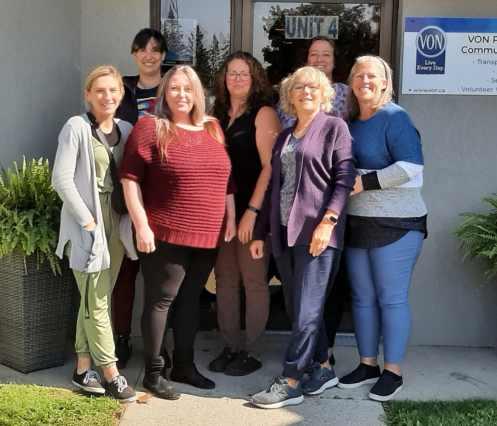Senior Supportive Living Program supports at-risk seniors to age at home

In an ideal world, seniors would be embraced by a network of family and community helpers. For some isolated seniors, this just isn’t the case. In Guelph and Wellington County, Ontario, VON’s Senior Supportive Living Program (SSLP) fills the gap, providing clients with the help they need to stay safely in their homes.
Last year, the program served 648 clients with over 13,000 visits, providing short-term crisis support to at-risk seniors and adults with physical disabilities.
Specially trained senior support workers (SSWs) provide assistance with personal care, such as toileting, bathing or eating, and with activities such as grocery shopping, meal preparation, laundry or light housework.
SSWs–personal support workers or developmental service workers with additional training–can also offer safety checks and help with a wide variety of issues. They might assist a client to complete forms for subsidies or advocate to ensure they can remain in supportive housing.
“Our ultimate goal is to care for people at home and get them surrounded by supports that can keep them there,” says Vanessa Terpstra, Manager of Home and Community Care. “We're able to support somebody holistically.”
Some SSLP clients leave the hospital with mobility issues. Many live in lower income housing. Some are lonely, due to difficult or non-existent relationships with family. Others are struggling with addictions, cognitive impairment or a mental health crisis.
“With the wide range of needs, it’s important that our staff members are well aware of other VON programs that can help, as well as the community resources that are out there,” Vanessa says. “It might be a Meals on Wheels program, transportation services or other long-term supports within the community.”
The team has developed strong relationships with other community providers, including the Canadian Mental Health Association, the Alzheimer's Society, the Canadian Cancer Society and Community Paramedicine Program paramedics, so clients can be inter-referred to get the wraparound care they need.
SSLP is funded by Ontario Health and is free of cost to clients. Individuals can self-refer or be referred by a general practitioner or care coordinator. Clients normally receive support for eight to 12 weeks, but that can be flexible. “We offer our array of services from a person-centred lens,” explains Vanessa.
She recalls a client who requested the SSW come to their doctor’s appointment. “Our senior support worker was there when the client received the news that they had stage IV cancer. We navigated that with them, finding cancer support groups, helping them with food and determining what other supports needed to be put in place. That client was with the program for longer than most, because that's a harder situation to adjust to, especially if you are lonely and isolated.”
Each SSW covers one area of the region, meaning clients benefit from one point of contact and staff do not have to travel over a vast rural area.
“People are living in some pretty difficult situations and we're trying to help navigate them,” says Vanessa. “The more support that they have wrapped around them, the less likelihood that they're going to go back to hospital.”


